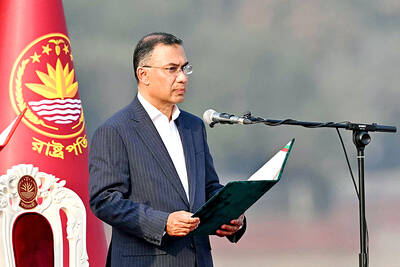Germany is gearing up for a major state ceremony next Tuesday to honor a group, led mainly by aristocratic army officers, which nearly succeeded in killing Nazi leader Adolf Hitler at his Wolf's Lair compound in 1944.
Chancellor Gerhard Schroeder has ordered a high profile commemoration for the 60th anniversary of the bomb plot and will himself make a speech at Berlin's Bendlerblock defense ministry where anti-Hitler leaders were executed by firing squad after the putsch was put down.
The bomb in Hitler's East Prussian headquarters was planted by Count Claus Schenk von Stauffenberg, the only member of the several hundred top people involved the coup attempt who had direct access to the Nazi Fuehrer.
Initially a supporter of Hitler like most officers, Stauffenberg was repulsed by Nazi atrocities and alarmed over the collapsing war effort.
Despite having lost an eye, his right hand and two fingers on his left hand in combat, the 36-year-old Stauffenberg managed to set a bomb timer and have the almost 1kg of Plastit W explosives placed in a briefcase close to Hitler during a war room briefing at the heavily guarded Wolf's Lair.
The bomb blast killed four of the 24 people in the room but Hitler was only lightly injured because the heavy oak table top and wide, massive legs, next to which the bomb was placed, deflected much of the blast.
Stauffenberg flew to Berlin to help lead the attempted military takeover of Nazi Germany -- but efforts swiftly collapsed after it was revealed that Hitler had survived.
Killing Hitler had been a key part of the plan because soldiers had been forced to swear an oath of allegiance to the Fueher since 1934.
"One could not lead the troops against Hitler," said the last living survivor of the putsch bid, Ewald Heinrich von Kleist, who is 82.
Von Kleist said that by killing Hitler it had been hoped to win over soldiers to break their oath and follow orders of the putsch leaders.
Stauffenberg along with three other officers were shot by firing squad in the huge courtyard of the Bendlerblock, which is now a memorial, while remaining the defense ministry headquarters in Berlin.
Hundreds of others involved in the plot were put on trial and executed by often barbaric methods.
As the news magazine Der Spiegel says, failure to kill Hitler and overthrow the Third Reich on July 20, 1944 "is one of the great tragedies of the 20th century."
The magazine argues that had the attempt succeeded it would have saved millions of lives given that between the failed plot and Nazi Germany's May 1945 defeat some 4 million Germans were killed, as were 1.5 soldiers in the Soviet Red Army, hundreds of thousands of US, British and other Allied soldiers and hundreds of thousands of concentration camp prisoners.
Although Stauffenberg and other members of the July 20 bomb plot have been elevated to hero status in Germany in recent years, this was far from the case in the first decades after the war.
In communist East Germany the aristocratic officers were termed "reactionary elements of U.S. imperialism" while in West Germany, many regard Stauffenberg as a traitor.
Some West German streets and schools might have been named after Stauffenberg and other executed members of the plot, but a poll in 1956 showed half the population opposed this.
Even West Germany's first chancellor, Konrad Adenauer, fueled such feelings by seeking to thwart the reappointment of a diplomat who had been involved in the anti-Hitler plot, Erich Kordt.
Adenauer, according to Der Spiegel, accused Kordt of already once having "betrayed" his boss.
But these views have now been buried and the 1944 bid to kill Hitler is this year being celebrated with lavish TV documentaries, feature films and exhibitions.
Chancellor Schroeder, who has a good nose for shifts in the public's mood, seems to have caught on to the changing view of Stauffenberg early during his first term in office.
One of his government's first military policy decisions after taking power in 1998 was to allow army recruits to swear their oath in the Bendlerblock courtyard where Stauffenberg was executed.
It was here, standing in the headlights of military vehicles before being shot by the firing squad, that the already wounded Stauffenberg shouted his final words: "Holy Germany lives!"
Although there has been some dispute over whether this was what he really said, his mourning widow later insisted, "that sounds just like him."

Heavy rain and strong winds yesterday disrupted flights, trains and ferries, forcing the closure of roads across large parts of New Zealand’s North Island, while snapping power links to tens of thousands. Domestic media reported a few flights had resumed operating by afternoon from the airport in Wellington, the capital, although cancelations were still widespread after airport authorities said most morning flights were disrupted. Air New Zealand said it hoped to resume services when conditions ease later yesterday, after it paused operations at Wellington, Napier and Palmerston North airports. Online images showed flooded semi-rural neighborhoods, inundated homes, trees fallen on vehicles and collapsed

‘COST OF DEFECTION’: Duterte’s announcement could be an effort to keep allies in line with the promise of a return to power amid political uncertainty, an analyst said Philippine Vice President Sara Duterte yesterday announced she would run for president of the Southeast Asian nation of 116 million in 2028. Duterte, who is embroiled in a bitter feud with Philippine President Ferdinand Marcos Jr, was impeached last year only to see the country’s Supreme Court throw the case out over procedural issues. Her announcement comes just days before her father, former Philippine president Rodrigo Duterte, begins a pretrial hearing at the International Criminal Court (ICC) in the Netherlands over crimes against humanity allegedly committed as part of a brutal crackdown on drugs. “I offer my life, my strength and my future

NOT YET THERE: While the show was impressive, it failed to demonstrate their ability to move in unstructured environments, such as a factory floor, an expert said Dancing humanoid robots on Monday took center stage during the annual China Media Group’s Spring Festival Gala, China’s most-watched official television broadcast. They lunged and backflipped (landing on their knees), they spun around and jumped. Not one fell over. The display was impressive, but if robots can now dance and perform martial arts, what else can they do? Experts have mixed opinions, with some saying the robots had limitations and that the display should be viewed through a lens of state propaganda. Developed by several Chinese robotics firms, the robots performed a range of intricate stunts, including martial arts, comedy sketches and choreographed

POST-UPRISING: Bangladesh Nationalist Party lawmakers were yesterday expected to formally elect Tarique Rahman as their leader and new head of government Bangladesh’s prime minister-to-be Tarique Rahman and lawmakers were yesterday sworn into parliament, becoming the first elected representatives since a deadly 2024 uprising. Rahman is set to take over from an interim government that has steered the country of 170 million people for 18 months since the autocratic government of Sheikh Hasina was overthrown. The lawmakers, who promised loyalty to Bangladesh, were sworn in by Chief Election Commissioner AMM Nasir Uddin. Bangladesh Nationalist Party (BNP) lawmakers are expected to formally elect Rahman as their leader, with President Mohammed Shahabuddin then to administer the oath of office to the prime minister and his ministers